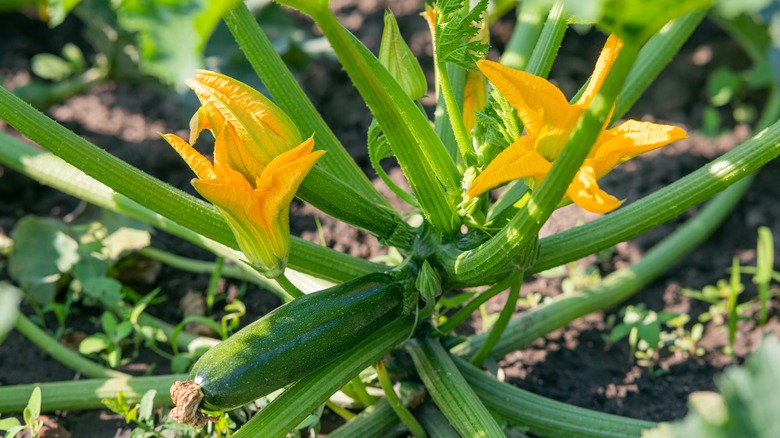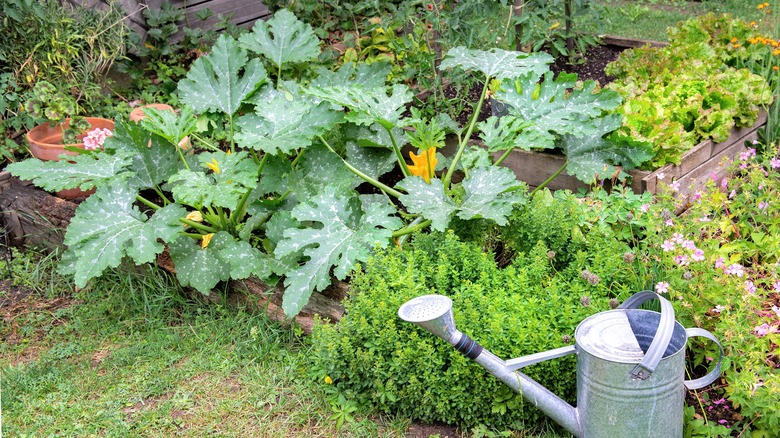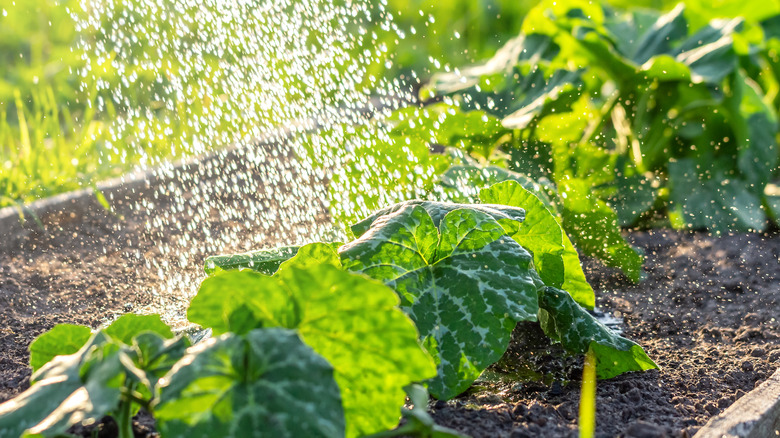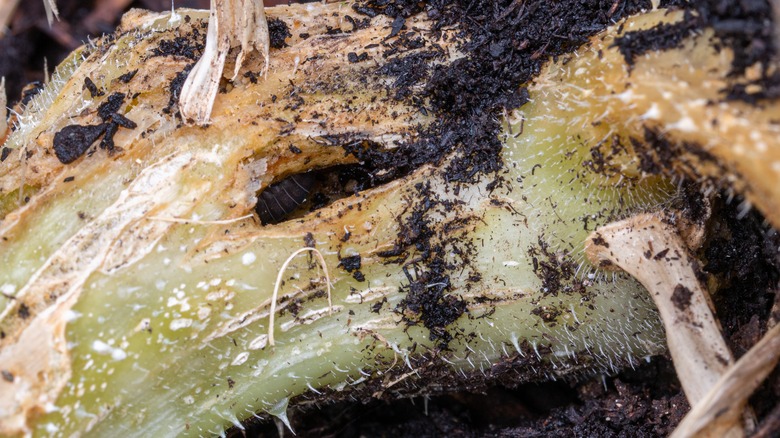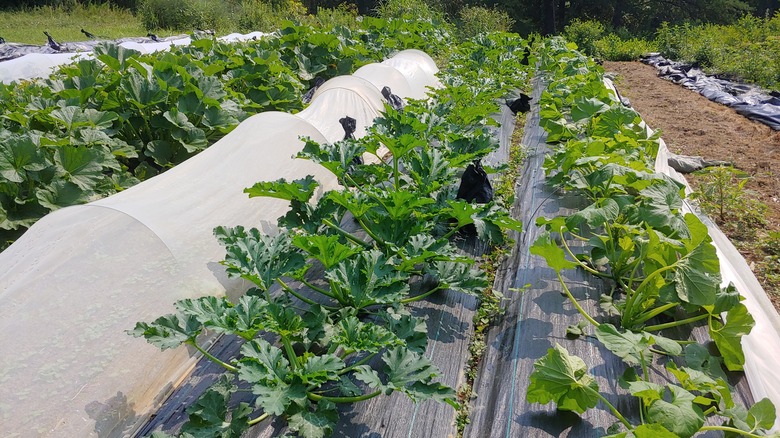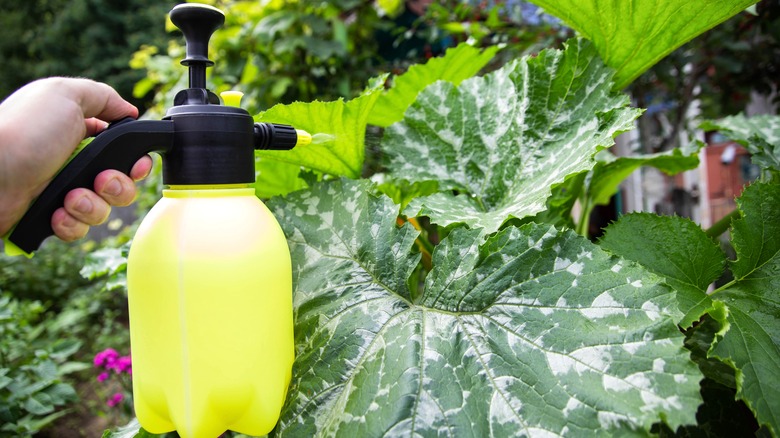How To Protect Your Zucchini Plants From Common Pests
We may receive a commission on purchases made from links.
Nothing says summer quite like harvesting gobs of zucchini and pawning off the surplus to anyone who will take some. However, when several pests infiltrate your crops, production can slow down significantly. Fortunately, there are several ways you can protect your zucchini plants without harming beneficial insects that pollinate zucchini plants and devour pests. Companion planting, row covers, aluminum foil, neem oil, and plain old water are all ways you can keep pests off your crops so you can keep the baskets of zucchini coming.
Keeping pollinators safe is crucial to get a big zucchini harvest. These pest control methods are natural and pose very little threat to pollinators. Even so, you should still be mindful of when and where you use these methods. Refrain from treating your zucchini plants in the middle of the day when pollinators are out working hard. If you grow your zucchini near a pollinator garden, watch for beneficial insect eggs that may have been laid on the zucchini rather than the designated area.
Attract beneficial insects with companion plants
The best way to fight pests safely is to let nature do all the work. Inviting beneficial insects to your garden will help keep a balance between predators and pests, allowing the pest population to stay under control. Every productive garden will have pests, but as long as there are good bugs, too, the pests shouldn't spiral out of control. You'll want to invite ladybugs, minute pirate bugs, and lacewings to your garden since they target aphids, spider mites, and whiteflies. Parasitic wasps, ground beetles, and tachinid flies are also good to keep in the garden.
Beneficial insects can be attracted by various plants and will stick around for the pests. The best flowers for insects will have easily accessible nectar and will be easy to land on. Try flat-topped flowers like Queen Anne's lace, cosmos, or dandelions. If you have aphids on your zucchini, try planting marigolds. Not only do they attract the good bugs, but they also deter aphids, making it a two-in-one form of pest control.
Handle pests with water
Water is perhaps the easiest way to handle pest problems organically. You can drown pests, kill them with soapy water, or spray them right off the plant. You can drown aphids by placing shallow pans of water near the zucchini plant. A yellow tray will attract them into the water. Once they're in it, they won't be able to escape. This method will have varying levels of success, but it's worth a shot if you can find the right spot for it. A more foolproof method is to wash pests right off the plants. Use a stream of water that's strong enough to remove pests but not so strong that it will damage the plants. Wash off any adults, larvae, or eggs you see. This method is the most effective against tiny pests, including spider mites and whiteflies.
Soapy water is another common solution for pests because it's so effective. All you need is a spray bottle of soapy water to get rid of whiteflies, mites, aphids, and thrips. You can use it on bigger pests, like vine borers and squash bugs, but it's more effective on the smaller pests that will be far removed from the plant when they're washed away. Be sure the soapy water fully coats the pests, or it won't be as effective.
Armor seedlings with aluminum foil
Some pests, like squash vine borers, eat into the plant and destroy it from the inside. You can stop these from ever being a problem by creating a physical barrier with the aluminum foil hack that keeps squash vine borers out of your garden. It works well because you can easily mold it around the plant without restricting growth. It also helps protect against aphids and any other pests that land on the plant. For vine borer protection, dig some soil away from the base of the plant to expose about an inch of the plant that was underground. Wrap foil around the plant from the soil line and up a couple of inches above the ground. Then, put the soil back into place to bury a portion of the foil. This will prevent vine borers and other hungry pests from entering the stem from above and below ground.
You can place foil around stems on any part of the plant, but don't cover flowers and leaves. Doing so will prevent pollinators from reaching the flowers or the leaves from receiving enough sunlight. Only cover the stems to prevent sap-sucking or plant-eating pests from tunneling through your zucchini plant.
Cover your plants to stop infiltrators
Similar to using aluminum foil, row covers will stop flying pests, like cucumber beetles and squash bugs, from finding your zucchini. Pests in the soil will still be able to do damage, so plant your zucchini in a clean bed that doesn't have last year's zucchini debris in the soil. Once you plant your seeds or seedlings, set up a row cover system to stop pests from getting in. You can get full sets on Amazon that come with hoops and plant covers for $25, so you don't have to buy them separately.
Be sure you choose a row cover that doesn't block the sun. Most white options will allow plenty of sunlight to get through and allow the young seedlings to get a healthy start. Remove the covers when you water your plants and put them back as soon as possible. Once the plants have flowers, remove the covers altogether so pollinators can come in and do their thing. Pests are an inevitable part of gardening, but protecting plants while they're young will alleviate many problems you'll face while growing zucchini.
Use neem oil as a natural pest control
A troublesome season of pest problems may lure you into the garden center's chemical section. However, before you bring out the stuff that can harm people, pets, and beneficial insects, try a natural solution first. Neem oil is a popular solution that can help kill existing pest problems. The oil is taken from the neem tree, so while it can kill bugs, it's completely natural. There are organic-certified options for those who want to participate in truly organic gardening.
You can use neem oil in the garden as both a repellent and a contact spray. When applied to a plant, it will stop adult pests from laying eggs and feeding on the plant. When applied directly on pests, they stop feeding, can't molt, and will die. Neem oil is most effective on larvae with soft bodies, so you may find it ineffective against adults. However, since it stops adults from laying eggs, it will pause the life cycle and significantly reduce the number of pests on your zucchini plants, which has the potential to stop them altogether. Neem oil works on any soft-bodied insect, so be mindful of where you apply it; watch out for eggs and larvae belonging to beneficial insects.

